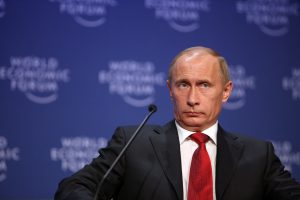Not all that is true is to be said out loud just any time. For now, the Russian president is destroying the Donbass with bombs. The aggression is raging and it is not at a time when the Russian president is putting Ukraine through this martyrdom that we should worry about “not humiliating Russia”.
Once Vladimir Putin has been pushed back into his own borders, it will be a different story. On that day, the mistake of the Treaty of Versailles shall not, of course, be repeated and it will be essential to be careful not to impose such peace conditions on Russia which leave it ruined, diminished and thinking only of revenge. On that day, everything must be done of course to integrate Russia into the concert of European nations. It will be necessary to help to root democracy in Russia and build with it a continent of stability and prosperity where war would be as inconceivable as it has become between Germany and France, but in these days of suffering and resistance, the task is quite different.
It is to defeat Mr. Putin, not to spare him, but to help Ukraine to push him back, not to “find him a way out” but to concede him nothing until he is resigned to cease fire and to propose his own way out, which he will eventually need to do, and on that day the Democracies would have no reason to refuse him.
It is at that point that the time will come to “not humiliate Russia”, but until aggression is defeated, this concern will be only a hiccup, the first of three mistakes not to be made today.
The second would be not being bold enough to take up the political challenge that the European Union now faces because… let us go back eight years.
In 2014, when Vladimir Putin started to attack Ukraine, he did not blame it for wanting to move closer to the Atlantic Alliance. He did not have to do so, as Ukraine was then overwhelmingly opposed to it. It was the Ukrainians’ desire to join the Union that cost them Crimea and has since put them under fire from the Russian president.
By not granting them the status of candidate country, the 27 would give legitimacy to this veto of Mr. Putin. By not granting the Ukrainians the status of candidate country, the Union would be recognising the Russian president’s right to reconstitute an empire against the will of the peoples who have freed themselves from it. The European Union cannot in any way support such nostalgia but, apart from running the risk of paralysis, the Union cannot proceed with new enlargements without modifying its institutions.
Apart from creating a totally ambiguous and rapidly unmanageable situation, it cannot even grant candidate status to new countries that would then have to wait some two decades before being fully counted among the Member States.
As things stand, the Union can therefore say neither yes nor no to Ukraine, but rather than create an independent “waiting structure” alongside it, of which Britain and the US would soon take over the controls, it must reinvent itself.
It must become a multi-stage Union, a single Union called the European Union, but in which three different entities would coexist. A free trade area governed by the rule of law, into which new members could very quickly join. This first of the three ensembles could be called the European Political Community mentioned by the President of the Republic of France. The second would be the current Union but tightened by the obligation to adopt the single currency. The third would be a political Union whose members would pool their defence, foreign policy and investment in the industries of the future.
None of these three tiers would be set up for eternity, since member states could move from one to the other as soon as they wished and could. This would be a major change, but it would prevent the 27 from missing their rendezvous with History by making the mistake of not reinventing themselves in the face of the return of war to Europe and would allow them, above all, to turn the need to enlarge their ranks into the means of deepening their unity.
As for the third mistake to be avoided today, it would be to fear a third world war when it has already begun. There is no need to fear it. We are already there, because although it does not send the whole world into battle as drastically as the Sarajevo bombing and the invasion of Poland did, Russia’s aggression against Ukraine will not have taken three months to be felt on five continents.
Bread shortages threaten Egypt, the Maghreb and sub-Saharan Africa. There is no longer a country where prices are not soaring, whether for food, energy or both. This situation is fraught with social crises that are themselves the source of political destabilizations and, strategically speaking, the evolution of the fighting in Ukraine weighs heavily on China’s assessment of the Taiwan issue.
The sustainability of Xi Jinping’s power is becoming as uncertain as the balance of power between the US and China. The war in Ukraine was instantly globalised. In this sense, it is already global, and we are thus only at the beginning of a very long and worrying chapter.
[/et_pb_text][/et_pb_column] [/et_pb_row] [/et_pb_section]

